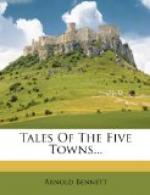‘Ye can go; I shan’t want ye,’ said Mr. Baines, returning to the clerk.
The lawyer never spoke of that night’s business. Why should he? To what end? Mark Beechinor, under the old will, inherited the seven hundred pounds and the house. Miss Mellor of Hanbridge is still Miss Mellor, her hand not having been formally sought. But Mark, secretary of the Labour Church, is married. Miss Mellor, with a quite pardonable air of tolerant superiority, refers to his wife as ’a strange, timid little creature—she couldn’t say Bo to a goose.’
* * * * *
THE DOG
This is a scandalous story. It scandalized the best people in Bursley; some of them would wish it forgotten. But since I have begun to tell it I may as well finish. Moreover, like most tales whispered behind fans and across club-tables, it carries a high and valuable moral. The moral—I will let you have it at once—is that those who love in glass houses should pull down the blinds.
I
He had got his collar on safely; it bore his name—Ellis Carter. Strange name for a dog, perhaps; and perhaps it was even more strange that his collar should be white. But such dogs are not common dogs. He tied his necktie exquisitely; caressed his hair again with two brushes; curved his young moustache, and then assumed his waistcoat and his coat; the trousers had naturally preceded the collar. He beheld the suit in the glass, and saw that it was good. And it was not built in London, either. There are tailors in Bursley. And in particular there is the dog’s tailor. Ask the dog’s tailor, as the dog once did, whether he can really do as well as London, and he will smile on you with gentle pity; he will not stoop to utter the obvious Yes. He may casually inform you that, if he is not in London himself, the explanation is that he has reasons for preferring Bursley. He is the social equal of all his clients. He belongs to the dogs’ club. He knows, and everybody knows, that he is a first-class tailor with a first-class connection, and no dog would dare to condescend to him. He is a great creative artist; the dogs who wear his clothes may be said to interpret his creations. Now, Ellis was a great interpretative artist, and the tailor recognised the fact. When the tailor met Ellis on Duck Bank greatly wearing a new suit, the scene was impressive. It was as though Elgar had stopped to hear Paderewski play ‘Pomp and Circumstance’ on the piano.
Ellis descended from his bedroom into the hall, took his straw hat, chose a stick, and went out into the portico of the new large house on the Hawkins, near Oldcastle. In the neighbourhood of the Five Towns no road is more august, more correct, more detached, more umbrageous, than the Hawkins. M.P.’s live there. It is the link between the aristocratic and antique aloofness of Oldcastle and the solid commercial prosperity of the Five Towns. Ellis adorned the portico. Young (a bare twenty-two), fair, handsome, smiling, graceful, well-built, perfectly groomed, he was an admirable and a characteristic specimen of the race of dogs which, with the modern growth of luxury and the Luxurious Spirit, has become so marked a phenomenon in the social development of the once barbarous Five Towns.




